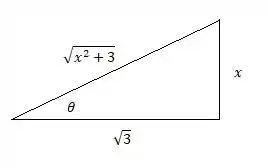Calcule a integral indefinida:
Passo 1
Para resolver essa integral vamos fazer uma substituição trigonométrica, temos que a expressão é da forma , nesse formato de expressão vamos fazer e utilizar a identidade trigonométrica :
Substituindo temos:
Agora usando a identidade trigonométrica:
Passo 2
Para calcular essa integral vamos usar substituição:
Aplicando vamos ter:
Passo 3
Agora é fácil achar as primitivas da função, usando uma expressão da Tabela de Integrais Indefinidas:
Agora é só aplicar:
Passo 4
Calma, não terminou ainda, vamos ter que voltar para a variável original :
Temos que , ou seja, , assim vamos usar o triângulo retângulo abaixo para achar :

Assim o valor de é:
Pronto, ficamos então com: